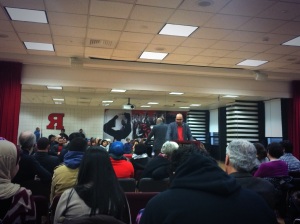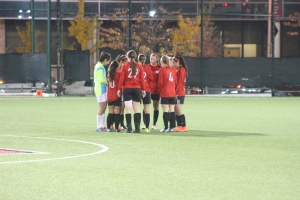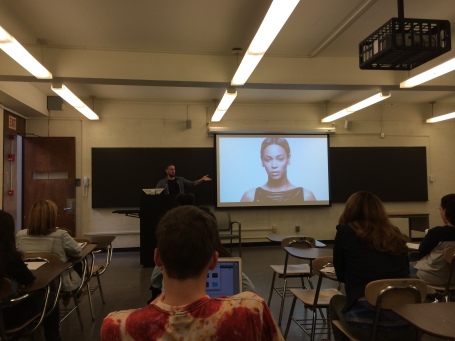By: Nancy Elias
Professor Steven Salaita, invited by Students for Justice in Palestine, visited Rutgers University-Newark on Tuesday, November 17, the first stop of his four day tour, to discuss his case against the University of Illinois. Salaita, a tenured professor of American Indian Studies at Virginia Tech, accepted a tenured job position at the University of Illinois, Champaign-Urbana and signed his contract in October of 2013. In early August 2014, Salaita learned that his contract had been terminated after he tweeted from his private Twitter account criticizing Israel for its attack on Gaza last summer, raising questions in his university and beyond about academic freedom and the position of the United States regarding the violence that is taking place in Gaza.
The university’s decision to terminate the tenured professor’s contract is, according to Salaita, a move that is symbolic for much deeper issues regarding the university, liberal arts, freedom of speech, and university politics and spending. “We’re entering an era where oppression is formalized,” Salaita said. In his case, this oppression was characterized by the university firing Salaita on the grounds of “civility.”
The liberal arts, which get their name from their act of “liberating” minds from institutional oppression, are, according to Salaita, at stake in his case against the University of Illinois. On top of the growing controversy of the case, Salatia has filed a lawsuit against the university on Monday, alleging that the university has violated its open records law. He argues, “Critical thinking is incompatible with conformity. The university’s actions are an attack on Indian Studies and liberal arts.” Salatia states that serious scholars think critically and must, for the sake of progress, challenge the world in which they live in. “UIC is happy to display its Indian Studies program in a pamphlet, but gets angry when the department does what it is supposed to do: think critically,” said Salaita.
The University of Illinois chided Salaita for making Jewish students uncomfortable with his beliefs and to this, Salaita responds, “a good education is supposed to make you uncomfortable. It’s supposed to make you think.” Salaita also asks,“which students are administrators helping? The perfect student, the student administration fights for, is their invention, and consists of the most privileged students. Management doesn’t include other students, who seem to only function in the university pamphlet for their multiculturalism.”
“Nobody asks about the comfort of Muslim students here, and this points out a problem. Those who disparage Palestinians don’t have to defend their beliefs. Israelis are assumed humans, but Palestinians must denounce aggression to be considered human in the first place,” added Salaita.
Salaita was accused of criticizing Jewish culture by the university, and to this he responds, “I’m no anti-Semite. I’m a man who condemned Israel’s actions. I oppose the state of Israel. That’s the extent of my opinion on Jewish culture,”
The controversy which arose as a result of firing Salaita because of his stand with Palestine is part of an ongoing movement to unionize faculty. Barbara Foley, Distinguished Professor of English, asked Salaita about those professors with no protection, namely non-tenured faculty, who according to Foley, “make up 75% of the faculty here at Rutgers University.”
“Non-tenure track faculty, which include adjunct professors, are not only under compensated for their labor, but can be fired on a whim, especially for expressing their political beliefs,” said Salaita.
Although these scholars, most with a PhD from a top university, are barely compensated for teaching their semester-long courses, administrators receive a much more generous salary for their non-academic positions. Sherry Wolfe, Contract Campaign Coordinator of the faculty union Rutgers AAUP-AFT added some statistics to the conversation, namely that, “79 faculty at Rutgers University make $200,000 and upwards, the most being the athletic coach who makes about $1.5 million dollars a year.”
Badr Rasi, senior at Rutgers University-Newark is a member of Students for Justice in Palestine and helped with the logistics of the event. “This even was every important to me, because in an age with increased corporate encroachment on the university and on learning space, both students and professors suffer the consequences. Today’s event demonstrates the impact of corporatization of universities and its effects on academic freedom,” Rasi said.
Rutgers University-Newark was also discussed during Salaita’s talk, whose comments about “for show” diversity struck a chord with students and staff members. “The marketing spin of Rutgers University-Newark is ‘the most diverse student body in the nation,’ but sadly this is not reflected in the diversity of courses and academic departments and opportunities that ensure an equally enlightening and safe campus climate to those coming from underprivileged backgrounds,” Rasi said.
Although upset by the firing which cost Salaita his job, health insurance, and financial stability, he states that the support of his colleagues and students have uplifted him to fight for his position, setting a precedence that he will not be bought out by the university for speaking his mind.
“I’ve upheld my end of the contract with the University of Illinois. I’m waiting, perhaps foolishly, for the university to uphold theirs. I’m upset for me, and for the students to whom I was a thesis advisor to. In their case, they are getting a real education,” said Salaita. Certainly, the issues surrounding his case of the university and politics are as real of a look inside academia as it gets.





